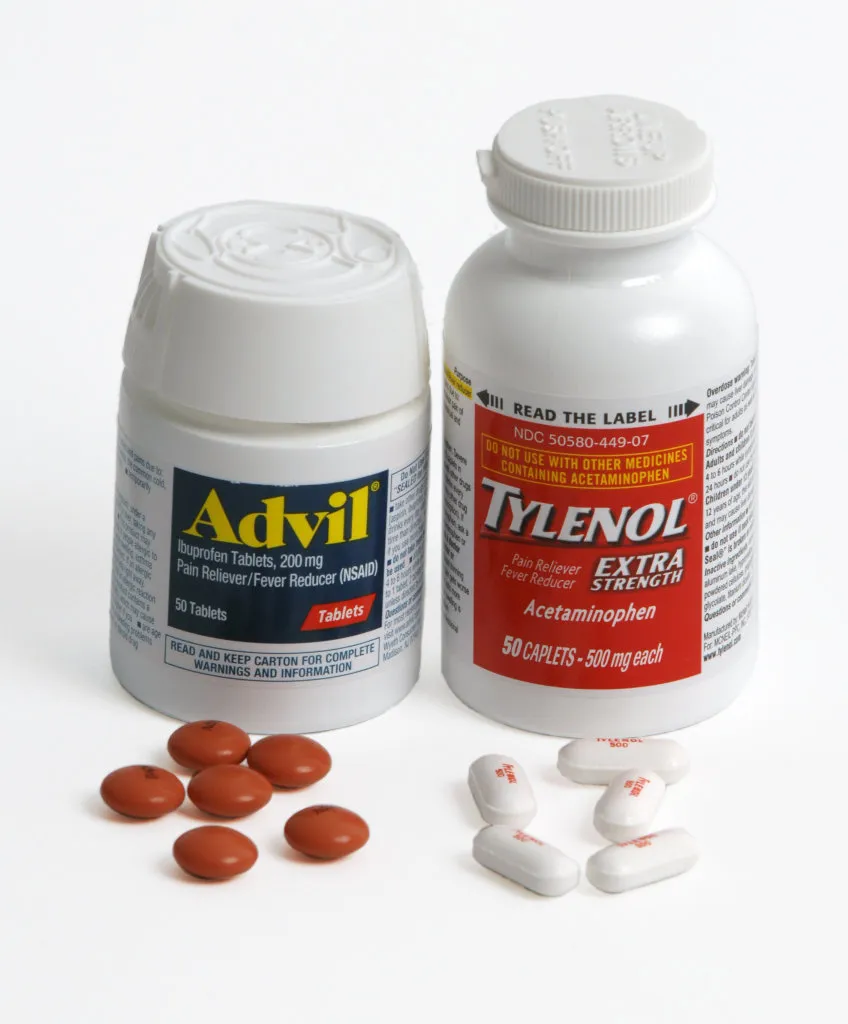Advil vs Tylenol: Comparing Pain Relievers for Effective Relief
When discomfort strikes, finding the right pain reliever can make all the difference. Advil and Tylenol are two popular choices that often leave people wondering which one to choose. In this comprehensive guide, we’ll dissect the Advil vs Tylenol debate, helping you make an informed decision tailored to your needs.
Understanding Advil and Tylenol:
Advil and Tylenol are household names, each with its own unique characteristics. Advil, containing ibuprofen, is classified as a nonsteroidal anti-inflammatory drug (NSAID). It targets inflammation, providing relief from pain and reducing fever. Tylenol, on the other hand, contains acetaminophen, which focuses primarily on pain relief and fever reduction. Both offer relief, but their mechanisms differ, influencing which one suits your needs best.

Advil: Pros and Cons:
Pros:
Advil’s forte lies in its anti-inflammatory prowess. This makes it an excellent choice for addressing conditions characterized by inflammation, such as muscle aches and arthritis. Its ability to target the root cause of pain by reducing inflammation can provide effective and targeted relief.
Cons:
However, Advil is not without its considerations. It may lead to stomach irritation and is associated with an increased risk of gastrointestinal issues. If you have a history of ulcers or digestive problems, consulting a healthcare professional before using Advil is essential. Additionally, Advil should be taken with food or milk to mitigate stomach irritation.
Tylenol: Pros and Cons:
Pros:
Tylenol’s strength lies in its gentle approach, particularly on the stomach. It is less likely to cause stomach irritation or ulcers, making it suitable for those with sensitive stomachs. Tylenol is often preferred for managing headaches and other forms of non-inflammatory pain.
Cons:
One of Tylenol’s drawbacks is its potential impact on the liver. Prolonged or excessive use of acetaminophen, the active ingredient in Tylenol, can strain the liver and lead to serious health issues. Following recommended dosages and avoiding alcohol while taking Tylenol are crucial steps to prevent liver damage.
Comparing Effectiveness for Different Types of Pain:
Advil and Tylenol each have their areas of expertise when it comes to pain relief. Advil’s anti-inflammatory properties make it a go-to choice for pain resulting from inflammation. Conditions like rheumatoid arthritis and sports injuries, where inflammation plays a significant role in exacerbating discomfort, can benefit from Advil’s targeted action.
Tylenol, while not as equipped to tackle inflammation, excels at managing mild to moderate pain that is not accompanied by inflammation. This makes it an excellent option for headaches, menstrual cramps, and other forms of pain where inflammation is not the primary factor.
Safety Profiles and Considerations:
Advil’s Safety Profile:
Advil’s anti-inflammatory properties, while effective, can pose certain risks. The potential for stomach irritation, ulcers, and gastrointestinal bleeding is higher with prolonged or excessive use. Individuals with a history of stomach ulcers, high blood pressure, or cardiovascular conditions should approach Advil with caution and seek medical advice before use. To minimize stomach-related issues, take Advil with food or milk.
Tylenol’s Safety Profile:
Tylenol’s gentle nature on the stomach is an advantage, making it a preferred option for those prone to gastrointestinal discomfort. However, it’s important to note that excessive use of acetaminophen can lead to serious liver damage. Carefully adhering to recommended dosages and avoiding alcohol while taking Tylenol are essential precautions to safeguard liver health.
Interactions and Precautions:
Both Advil and Tylenol can interact with other medications and have specific precautions. Advil, being an NSAID, can potentially interact with certain blood-thinning medications, increase the risk of bleeding, and affect kidney function. Tylenol, if taken in excessive amounts or combined with alcohol, can strain the liver and increase the risk of liver damage. Always inform your healthcare provider about all the medications you’re taking to ensure safe usage.
Combining Advil and Tylenol: Is it Safe?:
Understanding Combination Therapy:
Combining Advil and Tylenol, often referred to as “stacking” or “alternating,” is a strategy some individuals consider for enhanced pain relief. While this approach can be effective, it requires careful consideration and should be done under medical supervision.
Benefits and Risks:
Combining Advil and Tylenol can provide a more comprehensive approach to pain relief, as they target pain from different angles. Advil’s anti-inflammatory action complements Tylenol’s focus on pain relief and fever reduction. However, it’s important to note that excessive use or incorrect dosing can lead to potential health risks and adverse effects.
Consult a Healthcare Professional:
Before attempting to stack Advil and Tylenol, it’s crucial to consult a healthcare professional. They can guide you on the appropriate dosages, timing, and duration of combination therapy based on your specific needs and health status. Healthcare providers can also monitor your response to ensure optimal pain management while minimizing risks.
Natural Alternatives and Holistic Approaches:
Holistic Pain Management:
While Advil and Tylenol offer effective relief, exploring natural alternatives and complementary approaches to pain management can provide additional benefits. Techniques such as yoga, meditation, and acupuncture can help manage pain and promote overall well-being. Incorporating these practices alongside medication can contribute to a more holistic and balanced approach.
Lifestyle Changes and Diet:
Making lifestyle changes and adopting a healthy diet can also play a role in pain management. Incorporating anti-inflammatory foods, staying hydrated, and maintaining a regular exercise routine can contribute to reduced pain and improved quality of life.
Advil vs Tylenol: Frequently Asked Questions
1. Is Advil or Tylenol better for inflammation-related pain?
Advil (ibuprofen) is generally more effective for pain caused by inflammation, such as muscle aches and joint pain.
2. Can I take Advil and Tylenol together for enhanced pain relief?
Yes, combining Advil and Tylenol can provide a comprehensive approach to pain relief, but it’s important to follow medical guidance.
3. Which pain reliever is safer for long-term use?
Tylenol (acetaminophen) may be gentler on the stomach, while Advil (ibuprofen) carries a higher risk of stomach irritation with prolonged use.
4. Are there any interactions between Advil, Tylenol, and other medications?
Both Advil and Tylenol can interact with certain medications, so it’s important to consult your healthcare provider if you’re taking other drugs.
5. Can pregnant individuals take Advil or Tylenol?
Tylenol is generally considered safer during pregnancy, but it’s crucial to consult a healthcare professional before using any medication.
6. What are the potential side effects of Advil and Tylenol?
Advil may cause stomach irritation, while Tylenol can strain the liver if taken excessively. Follow recommended dosages to minimize risks.
7. Can I use Advil or Tylenol if I have a history of ulcers?
Tylenol is often considered gentler on the stomach, but it’s important to consult a healthcare provider if you have a history of ulcers.
8. Which pain reliever is suitable for headaches?
Tylenol is commonly used for headaches and non-inflammatory pain, while Advil may be more effective for headaches caused by inflammation.
9. Are there any age restrictions for using Advil and Tylenol?
Tylenol is often recommended for children due to its milder nature, but it’s important to follow age-specific dosages and guidelines.
10. How do I make an informed choice between Advil and Tylenol?
Consider your specific pain type, underlying health conditions, and consult a healthcare provider for personalized guidance.
Conclusion
Making an Informed Choice: Personalized Decision-Making:
Choosing between Advil and Tylenol is not a one-size-fits-all decision. It requires a thoughtful evaluation of your specific symptoms, underlying health conditions, and individual preferences. While Advil’s anti-inflammatory action is suited for certain types of pain, Tylenol’s gentler approach may be preferable in other scenarios.






